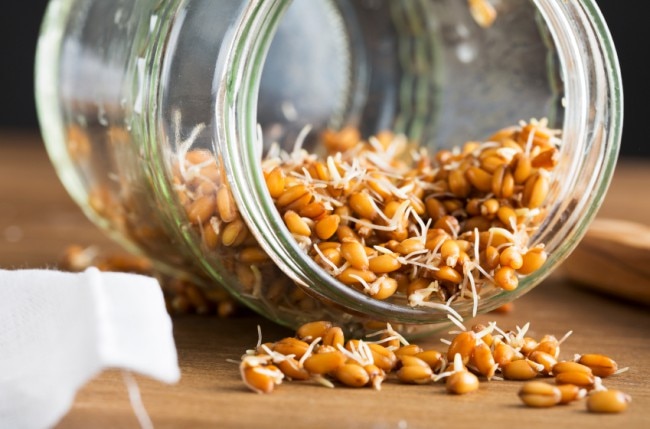I thought I was doing a good job by incorporating whole grains into my diet, regularly seeking out whole wheat or multi-grain bread, always opting for brown rice over white, courting quinoa and resisting the allure of a flaky croissant as often a humanly possible. But it seems like the ante has been upped, and now on top of whole grains I have to take it one step further and go for the gold—sprouted grains. But what are sprouted grains exactly—and are they a necessary part of a person’s diet?
Sprouted grains, deconstructed
There is at this time no regulated definition of “sprouted grain,” but here is an attempt at a quick breakdown:
Intact or whole grains contain a series of compounds that inhibit growth, so they don’t start sprouting at inappropriate times. But when environmental conditions are right, the seeds can germinate. This means the husk cracks open and the growth inhibitors lose their power, setting the seed free to do its thing.
Sprouted grains are in growth limbo, having partially started this growth process but not going all the way. What does happen, however, is the deactivation of anti-growth enzymes creates a greater bioavailability of vitamin C, folate and minerals like iron. Sprouting reduces carbohydrate levels and increases protein along with fiber—up to three times the amount of soluble fiber found in non-sprouted grains.
While some studies suggest this boosted nutritional profile translates into measureable benefits, such as improved blood sugar control, others believe the benefits of sprouted grains get lost in the cooking process.* When you dry the sprouted grain, grind it into flour, and expose it to heat, its benefits become minimal as compared to whole grains.
To maximize the benefits of sprouted grains, it’s best to eat them raw. You easily can mix sprouts into a salad.
As far as I am concerned, sprouted grains are a matter of personal exploration. You may find that sprouted grains are easier to digest, and/or that you feel more energized by eating them. They make a nourishing break from our go-to whole grain staples—an added layer of whole food juju. Plus, I feel a clearer sense of the grain’s raw life force—the inherent prana, or vital energy, present in fresh vegetables and fruits.
*These statements have not been evaluated by the FDA. These products are not intended to diagnose, treat, cure or prevent any disease.

